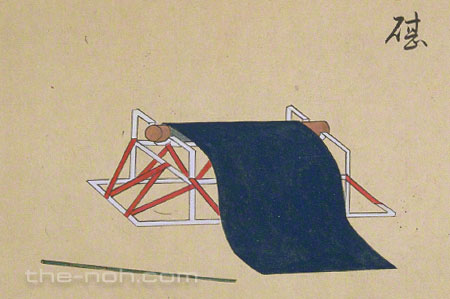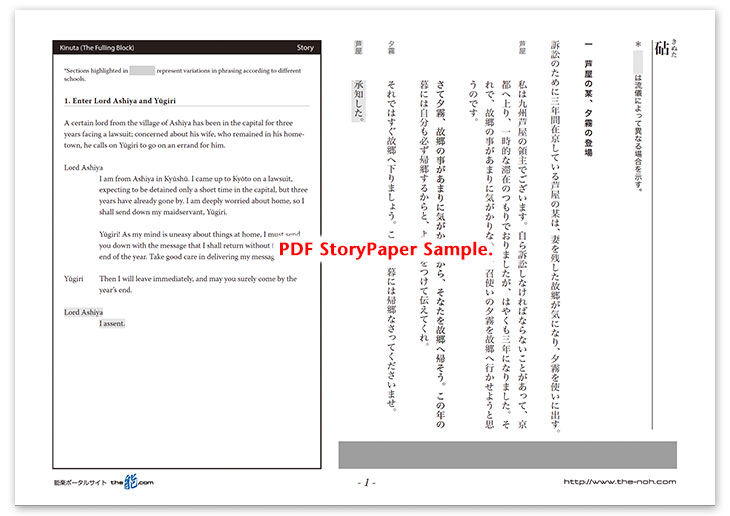
 Kinuta (The Fulling Block)
Kinuta (The Fulling Block)

![]()
A feudal lord of Kyūshū, the Lord of Ashiya, has been up to Kyōto for three years for the purpose of bringing a lawsuit and his wife is left alone, longing for his return. In the autumn of the third year of their separation, Yūgiri, the family maidservant, returns to Ashiya alone. The Lady laments her husband’s heartlessness, and seeking solace, she sends for a kinuta*: a fulling-block on which the women of the village beat their cloth, which she strikes in hope that its sound will carry her feelings to her husband in the capital.
Hearing that her husband is unable to return within the year however, the Lady becomes ill and eventually dies.
Learning of her death on his return, the Lord of Ashiya is mourning his wife’s passing when her emaciated ghost appears before him. Condemned to eternal damnation by her obsessive love for her husband, the Lady remains unable to forget him and complains of the tortures imposed by her concurrent feelings of love and jealousy, blaming her husband for his indifference. Soon, however, the chanting of the sutras by her husband releases her from her sufferings and she finds eternal rest.
*A kinuta, or fulling-block, refers to a wooden mallet, which was used to beat cloth so as to restore its softness and pristine gloss. It also refers to the wooden or stone block that was used to beat the cloth. The word also denotes the beating of cloth with this wooden mallet and the sound thereof.
![]()
Zeami, the author of this work, had a legitimate pride in it and is quoted as saying, “The people of aftertime will hardly appreciate such a Noh as this”. It is a tale of powerful human suffering, of the fretfulness of a middle-aged woman sleeping alone, the sorrow of love, and the bitterness of being consigned to oblivion, that is told in words that are full of poetic sentiment.
The first half of the play delineates the bitterness contained in the life of a woman, coming to a crescendo in the “kinuta-no-dan” or kinuta segment, during which the shite consigns her resentment to the kinuta on which she is striking, whilst she longs for the return of her husband. It is, too, a paean to the moon that evokes the Lady’s devoted attachment to her Lord. In the second half, the anguished spirit of the departed Lady appears and accuses her husband of disloyalty, and the audience is gripped by her devoted attachment to her Lord.
Citings from “Kokin Wakashū” (an early anthology of the waka form of Japanese poetry), “Shinsen Rōeishū” (an anthology of Chinese and Japanese poems and writings compiled by Fujiwara no Mototoshi), “Wakan Rōeishū” (an anthology of Chinese poems and 31-syllable Japanese waka for singing to fixed melodies), and other anthologies, give the world of this tale an added depth. The contrasting of the famous ancient tale of Sobu from “The Book of Han”, which tells of how the sound of the kinuta that is being beaten by his grief-stricken wife and children reaches Sobu across the miles, with that of the Lady of Ashiya as she beats the kinuta in sorrow is particularly noteworthy as her heartache appears all the more pronounced as a result.
The nuances of the chants, the symbolic kinuta prop, how it is carried on and off the stage and its position on it vary depending on the intentions of the school performing this piece.
STORY PAPER : Kinuta (The Fulling Block)
Story Paper presents noh chant stories in modern speech, with story outlines, highlights and more using Adobe PDF format, which can print out and zoom in. Print out the pages and take them with you when you see the actual noh performance.

The copyright of Story Paper is held by the Noh.com. Story Paper is for individual use only. It is prohibited by the copyright law to distribute or publish printed-out Story Paper pages without prior consent. For more information, check the credit and disclaimer pages.



 [Kinuta (The Fulling Block) : Story Paper PDF : 528KB
[Kinuta (The Fulling Block) : Story Paper PDF : 528KB